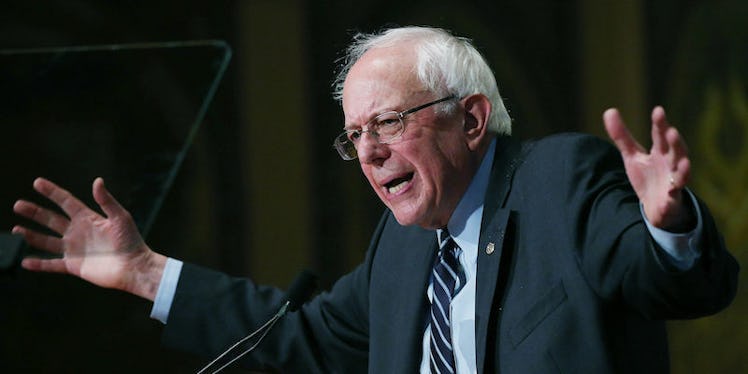
Bernie’s Health Care Plan Sounds Nice, But Is It Actually Realistic?
Just a few hours before the Democratic debate on Sunday, Bernie Sanders released his health care plan.
It was a call for a sweeping single-player (AKA universal) health care system where everyone gets insurance run by the government.
Essentially the government will take care of everyone's health needs, like in Canada. Cool, right?
Well, health and economic experts were not impressed.
Ultimately, according to multiple people, the health care plan just doesn't add up at all.
Healthcare policy sounds complicated, but it's really simple here: The plan would cost the government a ton of money, and Sanders doesn't have a reasonable explanation for where all this money will come from.
Jonathan Chait at New York Magazine said:
Sanders's health care plan uses the kind of magical-realism approach to fiscal policy usually found in Republican budgets, conjuring trillions of dollars in savings without defining their source.
Ezra Klein at Vox said the plan is "vague and unrealistic" and at best "a gesture toward a future plan."
Paul Krugman at the New York Times also said getting Sanders' plan to work would involve some trickery in the form of "a huge magic asterisk."
Universal health care would cost a lot. To keep those costs down, doctors would have to deny patients care and treatment, Krugman said, which obviously is not a good thing for people.
Klein also noted with no option besides the single insurer, not all treatments may be available:
If drug companies either sell to the government or they go out of business, then the government can get better prices. The problem there is obvious, though: What do people do if the government doesn't cover a treatment they need?
Meanwhile, Klein said, some hospitals would have to shut down if they're only getting lower Medicare prices for services.
Sanders said we'd get money to pay for health care from tax increases on the middle class and rich. Klein argued those tax raises would end up with "real economic drawbacks."
The Sanders plan claims people will save so much money in health care the tax increases won't really matter, but that's not necessarily true.
Not to mention, it's hardly believable Sanders would be able to pass such a new health care system in the first place, especially having seen how often Obamacare gets tested by Congress, as Steve Chapman at the Chicago Tribune brought up.
For the experts, the plan causes a lot of questions and concerns about Sanders' campaign promises and just how realistic they are.
Krugman said:
It’s not the kind of brave truth-telling the Sanders campaign pitch might have led you to expect.